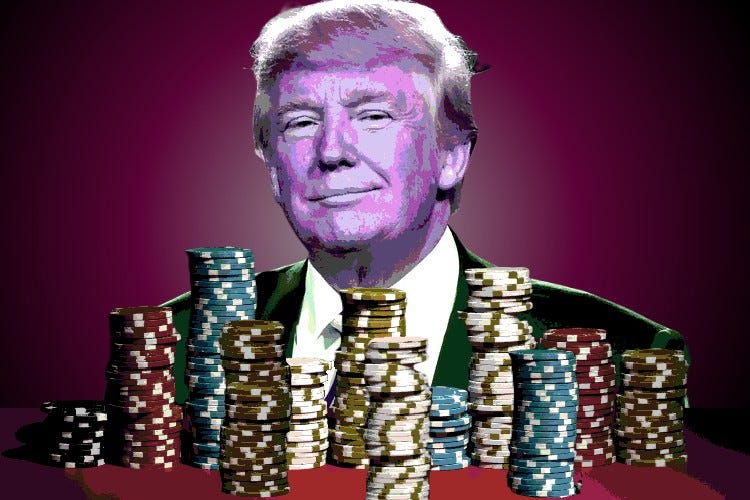What's Trump's Game on Tariffs?
Nate Silver may have cracked it, or maybe not

Trying to figure out what the fuck Trump is doing is like trying to picture what lies beyond the universe: It might be beyond the capacity of the human brain. Personally, I think Trump is just flailing wildly — he’s not just the dog who caught the car, he’s the dog who caught the car and somehow ended up driving. And at this point, he’s gnawing on the steering wheel and smashing buttons with his paws, hoping that everything will somehow work out.
Nate Silver prefers a more rational explanation: He thinks that Trump — or at least Trump’s recent tariff gambit — can be explained with game theory. Silver laid out his argument last week in a post that made some good points; I may need to tweak my preferred metaphor so that Trump is a dog driving a car competing against other dogs driving cars. You know, like in Air Bud 7 (which doesn’t exist yet, but eventually will). Silver likens Trump’s approach to tariffs to strategies used in poker, and if Trump’s thinking follows any rational framework, it’s probably the one Silver identifies.
Trump following a rational strategy would seem to be good news. But this blog doesn’t traffic in good news — “our leaders have made a sound decision” isn’t fertile ground for comedy. I think that Silver might be right about Trump’s thinking, but if so, Trump is playing America’s hand even worse than I thought. Because a dog driving a car has a nonzero chance of arriving safely at his destination, but a guy following a rational strategy with incorrect inputs is guaranteed to fail.
I encourage you to read Nate’s article, but let me provide a quick summary that will screw Nate out of a bit of subscription money (though you really should subscribe to Silver Bulletin — it’s excellent). Nate likens the tariff situation to a situation often found in poker: one in which one person has a lot of chips and one person has few chips. When this happens, the Big Fish can bully the Little Fish by repeatedly forcing them to go all-in; this puts some small percentage of the Big Fish’s stack at risk, but it’s an existential event for the Little Fish. And the Little Fish might fold because the if they lose, they’re finished — they’re either out of the tournament or the mob will break their thumbs (depending on the type of tournament). The asymmetric risk makes it possible for the Big Fish to extort a concession — the ante — from the Little Fish.



